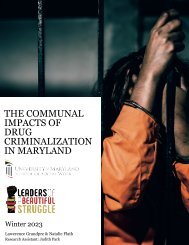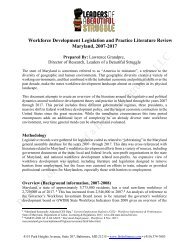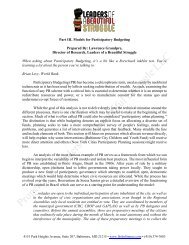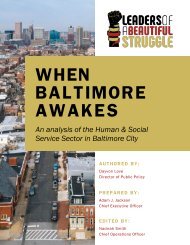Drug Decriminalization in Maryland Through an African Centered Research Paradigm- Analysis and Recommendations
This document offers guidance for theorizing questions related to a proposed research project purposed to advance drug decriminalization in Maryland.
This document offers guidance for theorizing questions related to a proposed research project purposed to advance drug decriminalization in Maryland.
- No tags were found...
Create successful ePaper yourself
Turn your PDF publications into a flip-book with our unique Google optimized e-Paper software.
conducive to aggressive, heavy-h<strong>an</strong>ded War on <strong>Drug</strong>s polic<strong>in</strong>g (Mart<strong>in</strong>ez <strong>an</strong>d Lee, 2020). It might<br />
be useful for researchers to look through this data dump <strong>an</strong>d see if there is <strong>an</strong>y relev<strong>an</strong>t <strong>in</strong>formation<br />
perta<strong>in</strong><strong>in</strong>g to <strong>Maryl<strong>an</strong>d</strong>. Moreover, no account of War on <strong>Drug</strong>s polic<strong>in</strong>g <strong>in</strong> <strong>Maryl<strong>an</strong>d</strong> would be<br />
complete without <strong>an</strong> <strong>in</strong> depth <strong>an</strong>alysis of the mach<strong>in</strong>ations around Baltimore’s Gun Trace Task<br />
Force, which used the War on <strong>Drug</strong>s’ delegitimation of street level drug sellers as leverage to<br />
violently attack <strong>an</strong>d rob drug dealers, themselves becom<strong>in</strong>g drug traffickers <strong>an</strong>d engag<strong>in</strong>g <strong>in</strong> other<br />
forms of violence aga<strong>in</strong>st the citizens of Baltimore (Lopez, 2018). View<strong>in</strong>g the Gun Trace Task<br />
Force not as the mach<strong>in</strong>ations of a few rogue cops, but as the <strong>in</strong>teractions of the power imbal<strong>an</strong>ce<br />
between the community <strong>an</strong>d the police force, helps to clarify how hav<strong>in</strong>g a more “exp<strong>an</strong>sive<br />
research frame on police statutory authority,” as Woods recommends, might look with<strong>in</strong> the<br />
context of <strong>an</strong> Afrocentric research paradigm. This would me<strong>an</strong> <strong>an</strong>alysis of drug decrim<strong>in</strong>alization<br />
must <strong>in</strong>clude <strong>an</strong>alysis of civili<strong>an</strong> oversight <strong>in</strong>stitutions, <strong>in</strong>clud<strong>in</strong>g the limitations of their oversight<br />
capacities because of legal obstacles such as the <strong>Maryl<strong>an</strong>d</strong> Law Enforcement Officer’s Bill of<br />
Rights. This would also require underst<strong>an</strong>d<strong>in</strong>g drug prohibition as what John Pfaff describes as a<br />
comprehensively broken legal system with several structural factors beyond the War on <strong>Drug</strong>s<br />
which must be addressed <strong>in</strong> order to challenge the perverse <strong>in</strong>centive towards over-polic<strong>in</strong>g,<br />
overproduction, overcharg<strong>in</strong>g, <strong>an</strong>d the lack of support for public defenders. <strong>Research</strong>ers would do<br />
well to engage his critique of the “st<strong>an</strong>dard model” expl<strong>an</strong>ation for hyper <strong>in</strong>carceration, centered<br />
on <strong>an</strong> over-focus on the War on <strong>Drug</strong>s <strong>an</strong>d “nonviolent drug offenders,” as it will be a useful<br />
start<strong>in</strong>g po<strong>in</strong>t for exp<strong>an</strong>d<strong>in</strong>g frames of <strong>an</strong>alysis for research on drug decrim<strong>in</strong>alization.<br />
Given the uniqueness of the Americ<strong>an</strong> crim<strong>in</strong>al legal system <strong>an</strong>d our <strong>an</strong>alysis of the<br />
limitations of the Portuguese model, researchers should be dubious of claims that data from other<br />
nations c<strong>an</strong> serve as sufficient proof of the efficacy of drug decrim<strong>in</strong>alization. Not only because of<br />
the role of structural racism <strong>an</strong>d <strong>an</strong>ti-Blackness <strong>in</strong> America, but because of the clear difference <strong>in</strong><br />
medial <strong>in</strong>frastructure for the poor. Illustrated by the fact that America is one of the few<br />
<strong>in</strong>dustrialized nations which still does not offer a guar<strong>an</strong>tee of some basic form of universal health<br />
care for its population. This does not, however, me<strong>an</strong> that other nations' experiences are not useful<br />
places for research. An Afric<strong>an</strong>-centered research paradigm would advocate for <strong>an</strong> <strong>in</strong>creased focus<br />
on nations which more accurately mirror the United States <strong>in</strong> their racial dynamics, such as Brazil<br />
<strong>an</strong>d South Africa. While these nations are typically ignored <strong>in</strong> decrim<strong>in</strong>alization literature, both<br />
have court rul<strong>in</strong>gs on c<strong>an</strong>nabis decrim<strong>in</strong>alization. Which, accord<strong>in</strong>g to m<strong>an</strong>y, are typically not<br />
enforced on the ground, have nascent legalization movements fac<strong>in</strong>g pushback, <strong>an</strong>d are not l<strong>in</strong>ked<br />
to larger social justice movements, both of which may serve as a necessary cautionary tale for the<br />
efficiency of decrim<strong>in</strong>alization <strong>in</strong> the United States (Nel, 2018; Veit, 2019).<br />
It is with<strong>in</strong> the methodology of <strong>in</strong>stitutional <strong>an</strong>alysis <strong>an</strong>d assess<strong>in</strong>g community capacity<br />
that we c<strong>an</strong> offer suggestions on how to <strong>an</strong>swer a critical research question <strong>in</strong> more detail: how<br />
exactly does one def<strong>in</strong>e decrim<strong>in</strong>alization. As previously stated, the st<strong>an</strong>dard model has <strong>an</strong><br />
4151 Park Heights Avenue, Suite 207, Baltimore, MD 21215 • www.lbsbaltimore.com • (410) 374-7683









